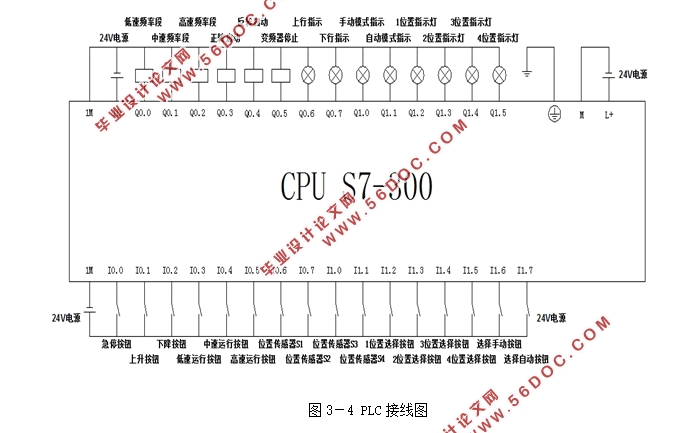基于PLC控制的物流仓库升降机设计
来源:wenku7.com 资料编号:WK718517 资料等级:★★★★★ %E8%B5%84%E6%96%99%E7%BC%96%E5%8F%B7%EF%BC%9AWK718517
以下是资料介绍,如需要完整的请充值下载。
1.无需注册登录,支付后按照提示操作即可获取该资料.
2.资料以网页介绍的为准,下载后不会有水印.资料仅供学习参考之用. 密 保 惠 帮助
资料介绍
基于PLC控制的物流仓库升降机设计(论文10500字)
摘要:物流仓库升降机,是一种用于自动化立体仓库(自动化立体仓储)的一种存取自动化,操作简便的升降机。PLC控制仓库升降机有如下的特点:可靠性高、编程简单、控制灵活。因此,本设计是用PLC针对仓库升降机的控制系统的设计具有一定的实际意义。
本设计是用西门子S7-300PLC作为控制核心,首先,实现对物流仓库升降机系统方案的设计。然后,对PLC、变频器、电动机、显示、控制面板等硬件部分进行设计并使用西门子STEP 7软件编程,使用S7-PLCSIM和组态王软件仿真。最后,完成对整个系统的测试。本设计论文通过在西门子PLC实训室模拟装调,实现了升降机手动和自动切换,并且能够变速上下移动的功能。
关键词:升降机;可编程序控制器;变频器;PLC;组态
Design of Logistics Warehouse Elevator Based on PLC Control
Abstract:The Logistics Warehouse Lift is an access automation and easy-to-use lift for automated warehouses (automated three-dimensional storage). PLC control warehouse elevators have the following characteristics: high reliability, simple programming, and flexible control. Therefore, this design has certain practical significance for the design of the control system for the warehouse elevator with PLC.
This design uses Siemens S7-300PLC as the control core. First, it realizes the design of the logistics warehouse elevator system. Then, the hardware parts such as PLC, inverter, motor, display, control panel, etc. are designed and programmed with Siemens STEP 7 software, using S7-PLCSIM and Kingview software simulation. Finally, complete the testing of the entire system. This design paper realizes the manual and automatic switching of the elevator through the simulation of the installation and adjustment in the Siemens PLC training room, and the function of shifting up and down.
Key words:Elevator;Programmablelogiccontroller;Inverter;PLC;Configuration

目 录
1 绪论 1
1.1 升降机的应用和发展 1
1.2 课题研究意义 1
2 系统方案设计 2
2.1 物流仓库升降机设计框图 2
2.2 物流仓库升降机设计的工作过程 3
2.3 物流仓库升降机设计结构 3
3 硬件电路设计 4
3.1 PLC控制系统简介与设计 4
3.2 物流升降机接线图及I/O分配表 7
3.3 变频器简介与选用 9
3.4 电路设计和控制面板设计 10
4 软件设计及仿真 12
4.1 控制流程图设计 12
4.2 梯形图设计与分析 14
4.3 调试与仿真 18
5 总结与展望 30
参考文献 31
致谢 32
附录 33
|



